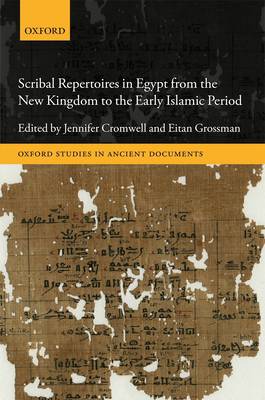
- Afhalen na 1 uur in een winkel met voorraad
- Gratis thuislevering in België vanaf € 30
- Ruim aanbod met 7 miljoen producten
- Afhalen na 1 uur in een winkel met voorraad
- Gratis thuislevering in België vanaf € 30
- Ruim aanbod met 7 miljoen producten
Zoeken
Scribal Repertoires in Egypt from the New Kingdom to the Early Islamic Period
€ 202,45
+ 404 punten
Omschrijving
Scribal Repertoires in Egypt from the New Kingdom to the Early Islamic Period deals with the possibility of glimpsing pre-modern and early modern Egyptian scribes, the actual people who produced ancient documents, through the ways in which they organized and wrote those documents. While traditional research has focused on identifying a 'pure' or 'original' text behind the actual manuscripts that have come down to us from pre-modern Egypt, the volume looks instead at variation - different ways of saying the same thing - as a rich source for understanding the complex social and cultural environments in which scribes lived and worked, breaking with the traditional conception of variation in scribal texts as 'free' or indicative of 'corruption'. As such, it presents a novel reconceptualization of scribal variation in pre-modern Egypt from the point of view of contemporary historical sociolinguistics, seeing scribes as agents embedded in particular geographical, temporal, and
socio-cultural environments. Introducing to Egyptology concepts such as scribal communities, networks, and repertoires, among others, the authors then apply them to a variety of phenomena, including features of lexicon, grammar, orthography, palaeography, layout, and format. After first presenting this conceptual framework, they demonstrate how it has been applied to better-studied pre-modern societies by drawing upon the well-established domain of scribal variation in pre-modern English, before proceeding to a series of case studies applying these concepts to scribal variation spanning thousands of years, from the languages and writing systems of Pharaonic times, to those of Late Antique and Islamic Egypt.
socio-cultural environments. Introducing to Egyptology concepts such as scribal communities, networks, and repertoires, among others, the authors then apply them to a variety of phenomena, including features of lexicon, grammar, orthography, palaeography, layout, and format. After first presenting this conceptual framework, they demonstrate how it has been applied to better-studied pre-modern societies by drawing upon the well-established domain of scribal variation in pre-modern English, before proceeding to a series of case studies applying these concepts to scribal variation spanning thousands of years, from the languages and writing systems of Pharaonic times, to those of Late Antique and Islamic Egypt.
Specificaties
Betrokkenen
- Uitgeverij:
Inhoud
- Aantal bladzijden:
- 416
- Taal:
- Engels
- Reeks:
Eigenschappen
- Productcode (EAN):
- 9780198768104
- Verschijningsdatum:
- 21/02/2018
- Uitvoering:
- Hardcover
- Formaat:
- Genaaid
- Afmetingen:
- 236 mm x 160 mm
- Gewicht:
- 748 g

Alleen bij Standaard Boekhandel
+ 404 punten op je klantenkaart van Standaard Boekhandel
Beoordelingen
We publiceren alleen reviews die voldoen aan de voorwaarden voor reviews. Bekijk onze voorwaarden voor reviews.










